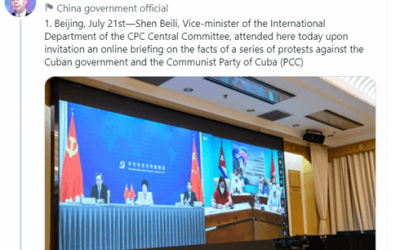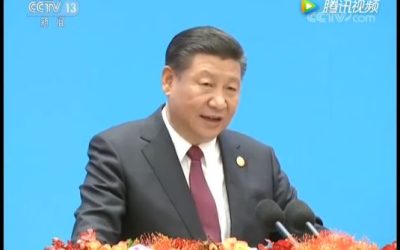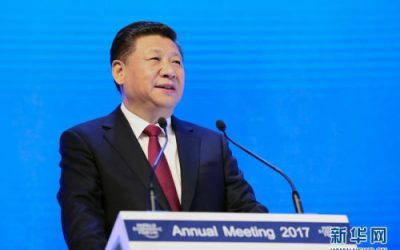Discussion of a supposed China-US ‘Thucydides trap’ is based on a sentence from ancient Greek historian Thucydides on the Athens-Sparta war of classical Greece: ‘It was the rise of Athens and the fear that this inspired in Sparta that made war inevitable.’ The comparison asserted is that China’s rise, confronted with a US ‘superpower’, makes serious conflict inevitable.
But the ’Thucydides trap’, like all analogies, illustrates not only similarities but differences. It is crucial to separate these, as a situation is determined by the totality of forces operating in it. It is erroneous to isolate a single common element because every historical situation is specific. Furthermore, ancient Chinese wisdom is as wise as Greek for as Xi Jinping cited: ‘The Chinese recognised as early as 2,000 years ago that “though a country is now strong, bellicosity will lead to its ruin.’[1] The combination of China’s ancient wisdom with its modern accurate Marxist analysis shows why a US-China ‘Thucydides trap’ is avoidable.
Mutual benefit
The first fundamental difference of the present to any ‘Thucydides trap’ is economic. In the ancient world, indeed in all human history before the Industrial Revolution, economic growth was insignificant – possibly under 0.1% a year. As no objective possibility existed for harmonious economic cooperation of countries to produce significant growth, war to seize assets created by others, enslavement of populations etc. was rational policy.
The Industrial Revolution radically accelerated economic growth, now capable of reaching ten percent annually, thereby fundamentally changing the relative economic benefits of war and peace. The most successful developing countries, South Korea or China, can go from low to high or near high income status in a single lifetime – something previously impossible. In advanced economies from World War II until the international financial crisis living standards rose almost uninterruptedly.
In contrast war was accompanied by economic decline for almost all major powers in the last century regardless of whether they won or lost (Britain, France, Germany, Japan), while peace saw economic expansion – the US was an exception as World War II saw the fastest economic growth in its history. World War I’s immense devastation ended an almost 500-year period during which Europe had been the world’s most dynamic economic centre.
US launched wars were equally key to its relative decline from its peak dominance following World War II. Vietnam unleashed economically destabilising inflation the US needed two decades to recover from. The 2003 Iraq invasion cost $1-3 trillion, depending on estimates, and to restabilise the US economy after the international financial crisis Obama had to significantly reduce US military expenditures. The effects on US domestic opinion of economic damage done to the US by these wars is analysed below.
War producing national weakening illustrated British historian AJP Taylor’s remark that maintaining a position as a Great Power rests on possessing the ability to fight a major war while avoiding the cost of actually doing so – a Western rediscovery of the ancient Chinese wisdom Xi Jinping cited.
The fundamental reason, in addition to cost, peace is associated with economic strengthening and war with decline is clear. The foundation of economics, first formulated by Adam Smith, is that division of labour is the most powerful force increasing productivity. This includes international division of labour which, except in the most exceptional circumstances, requires peace. In the modern epoch peace’s economic benefits therefore almost invariably exceeded war’s.
Actual wars
As the Industrial Revolution transformed the potential for economic growth, fundamentally changing the relative gains of peace and war, many Western historians prefer to concentrate in studying major interstate conflicts on an analogy to 1914 or more recent episodes rather than Thucydides. Furthermore, if peace’s ‘upside’ gains are now greater than in earlier historical periods nuclear weapons mean war’s ‘downside’ losses are also far greater. This is certainly one reason why in reviewing 16 major cases of rising global or regional powers since the 16th century the US historical study by Graham Allison at the Harvard Kennedy School found most earlier ones ended in war while the three most recent did not.
But the fundamentally changed economic conditions compared to Thucydides epoch clearly has not prevented wars taking place – including the First and Second World Wars. Therefore, how should the possibility of major US-China conflicts be analysed in the light of the lessons of conflicts since the Industrial Revolution? They may be considered chronologically.
Britain confronted with US rise
The US grew more rapidly than the existing ‘superpower’ Britain throughout the 19th century. By the 1870s the US economy was larger than Britain’s and by 1918 the US had overtaken Britain to become the world’s most powerful state. This example itself proves there is no inevitability of a ‘Thucydides trap’ – the existing superpower, Britain launched no serious war against the US. Why?
Because Britain’s defeat in war against the US would have been inevitable therefore the UK never undertook it – suicide was not a rational strategy for British capitalism! Having noted that US-UK relations prove there is no inevitable ‘Thucydides trap’ what lessons may be drawn from the subsequent conflicts?
World War I
The declining British Empire had an alternative successor power to the US – Germany. The UK refused war against the US but fought two World Wars against Germany. The difference was that Britain could defeat Germany – emerging victorious in both conflicts.
The lessons of these two World Wars are clear. Analysing first 1914 some Western historians claim this compares to present US-China relations – the established power the US being comparable to Britain in 1914 and China to the rising aggressive power of Germany. Unfortunately, this analogy leads to the exact opposite conclusion enemies of China wish to assert!
If in 1914 Germany launched an aggressive war why do historians analyse this occurred? The reason was that while Germany was catching up with the UK economically, Germany was drastically losing the economic race with the US and its military position was deteriorating relative to Russia. German Chief of Staff von Moltke’s notorious 1912 declaration that ‘war is unavoidable and the sooner the better’ was explained by him as due to Russia’s military strengthening and the German army becoming financially constrained. German ruling circles felt their position had passed the apogee of their power, Germany was weakening.
China’s position is the direct opposite of Germany in 1914. Far from weakening compared to the US China is strengthening. China’s military position is still globally inferior to the US but growing stronger. The rational policy for China is the exact opposite of aggression – it is to wait. Indeed, on the pre-1914 analogy, the logical candidate for launching ‘pre-emptive war’, on the supposed 1914 German model would be the US – a country whose relative military strength is currently near its peak but whose economy is less dynamic and rapidly growing than China’s.
Much evidence could be presented to support that thesis – the US has a proven record of launching aggressive, if unsuccessful, wars, with the Iraq being the latest example, while China has no such record. The conclusion of the 1914 analogy would be that it is the declining power, the US, which is aggressive.
World War II
Turning to World War II there is no mystery among historians as to why this occurred. Confronted with Nazism Britain and France showed extreme weakness in their ‘appeasement’ policy – leadi
ng to Hitler’s ability to launch war. Similarly, apparent Soviet military weakness during war against Finland in 1939-40 led Hitler to conclude he could attack the USSR in 1941. World War II showed countries’ weakness created a rapid path to war.
Cold War
Turning to the post-1945 Cold War there is no mystery as to why neither the US nor the USSR launched war against the other – it would have been nuclear leaving both countries devastated. Conflict was only localised, and by proxy. Above all the Cold War tested the relative economic dynamism of the two countries – the USSR achieving the apogee of its power in the early 1970s when its economy reached 40-45% of the size of the US.
But by the early 1980s the USSR’s failure to launch an effective economic reform of China’s type led to Soviet economic stagnation. The USSR was not defeated militarily, or because of demand for Western style democracy, but because its economy failed.
A further Cold War lesson was that when the US was weak it became ‘peaceful’ – US recognition of China in the early 1970s and detente with the USSR, were launched in the context of the US’s Vietnam defeat. When the US regained strength, as in the 1980s, it embarked on a more aggressive policy. By the 1980s the USSR was militarily strong but economically weak. The US, therefore, piled pressure on the Soviet economy – the key Reagan military build-up of the 1980s was not aimed at war but to overstrain the weak Soviet economy.
Present situation
Turning to present China-US relations what lessons from history may be drawn on how a ‘Thucydides trap’ can be avoided?
One is that the major sections of the US policy establishment will not cease an aggressive policy if China shows weakness. This was a disastrous mistake made during Gorbachev’s period, facilitating the USSR’s collapse. Top Gorbachev foreign policy adviser Georgi Arbatov famously declared to the US: ‘We are going to do a terrible thing to you–we are going to deprive you of an enemy’ – advocating extreme concessions to the US. The US duly accept the concessions, proceeded to split up the USSR, and moved NATO to Russia’s borders.
This lesson of the Gorbachev period repeated that of the Cold War – when the US felt weak it adopted ‘friendly’ positions and when it felt strong it adopted aggressive ones. Marxism confirms this is inevitable. The US is a capitalist state; its economy is founded on competition. The US is peace-loving when it judges it will lose.
But forms of competition change. In a sense US relation with China are the opposite of those towards the Cold War’s end. Then the USSR was militarily strong but economically weak: the US did not possess overwhelming military superiority but was stronger economically. US strategy was therefore to shift issues onto economic competition.
China-US relative strengths are the opposite. China’s economy is more rapidly growing than the US, but the US possesses global military superiority. US strategy therefore:
- Attempts to shift issues towards military tension – as with South China Sea provocations.
- Attempts to slow China’s economy, for example by excluding China from trade agreements
Do US attempts to shift issues onto the military terrain make a ‘Thucydides trap’ inevitable? No, because the US is not undifferentiated, it is divided into classes.
A US military build-up against China, let alone war, would require massive redeployment of US resources from civilian to military uses. As the US economy is growing slowly, around two percent annually, this would mean slowing or decline in the US population’s living standards leading to major discontent.
There are only two conditions in which the US would be able to undertake a ‘Thucydides’ aggressive policy towards China.
First, if the US population suffering a huge defeat making it unable to prevent large reductions in its living standards – major resources could then be transferred into military expenditure without resistance. Certainly when the US population feels its vital interests are threatened, as by Japan in World War II, it shows the same degree of resistance as any other country. China is therefore wholly correct to avoid threatening US core interests. But the trend since 1945 shows the US population is increasingly unwilling to make sacrifices for non-core interests – in large part because of the by-products of the damage done to the US economy by its wars. Chronologically within the US:
- resistance to the Korean war was insignificant;
- opposition to the Vietnam war was initially weak but grew until it halted the war,
- opposition to the 2003 Iraq invasion was initially large and the war is now overwhelming regarded as disastrous.
- there is US majority opposition to major new Middle East wars other than against the terrorist ISIS which publicly threatens the US.
As China pursues no adventurist policy against the US there is therefore no indication the US population is willing to make the sacrifices required for a ‘Thucydides’ type struggle against China.
The second condition under which the US could undertake a ‘Thucydides’ confrontation with China would be if China’s economy seriously slowed. Then the US could outpace China in a military build-up without placing a great economic burden on its own population. China cannot decisively influence trends in the US, but the most fundamental condition China must achieve to avoid a ‘Thucydides trap’ with the US is therefore to be strong – which relies on China’s economic success.
The two conditions are interrelated. The stronger is China the greater the sacrifices the US population would have to make to engage in a ‘Thucydides’ confrontation and therefore the less willing they are to tolerate it. Any view China’s strength ‘provokes’ the US is the opposite of the truth. It is China’s weakness which would allow the US to move towards a ‘Thucydides trap’ confrontation.
Xi Jinping accurately summarised the correctness of both ancient and modern Chinese wisdom on China-US relations: ‘There is no such thing as the so-called Thucydides trap.’[2]
This article was originally published in Chinese by Cankaoxiaoxi.
References
[1] Xi, Jinping. (2015, September 24). Full Text of Xi Jinping’s Speech on China-U.S. Relations in Seattle. Retrieved August 25, 2016, from CRI English.com: http://english.cri.cn/12394/2015/09/24/3746s897214.htm
[2] Xi, Jinping. (2015, September 24). Full Text of Xi Jinping’s Speech on China-U.S. Relations in Seattle. Retrieved August 25, 2016, from CRI English.com: http://english.cri.cn/12394/2015/09/24/3746s897214.htm






